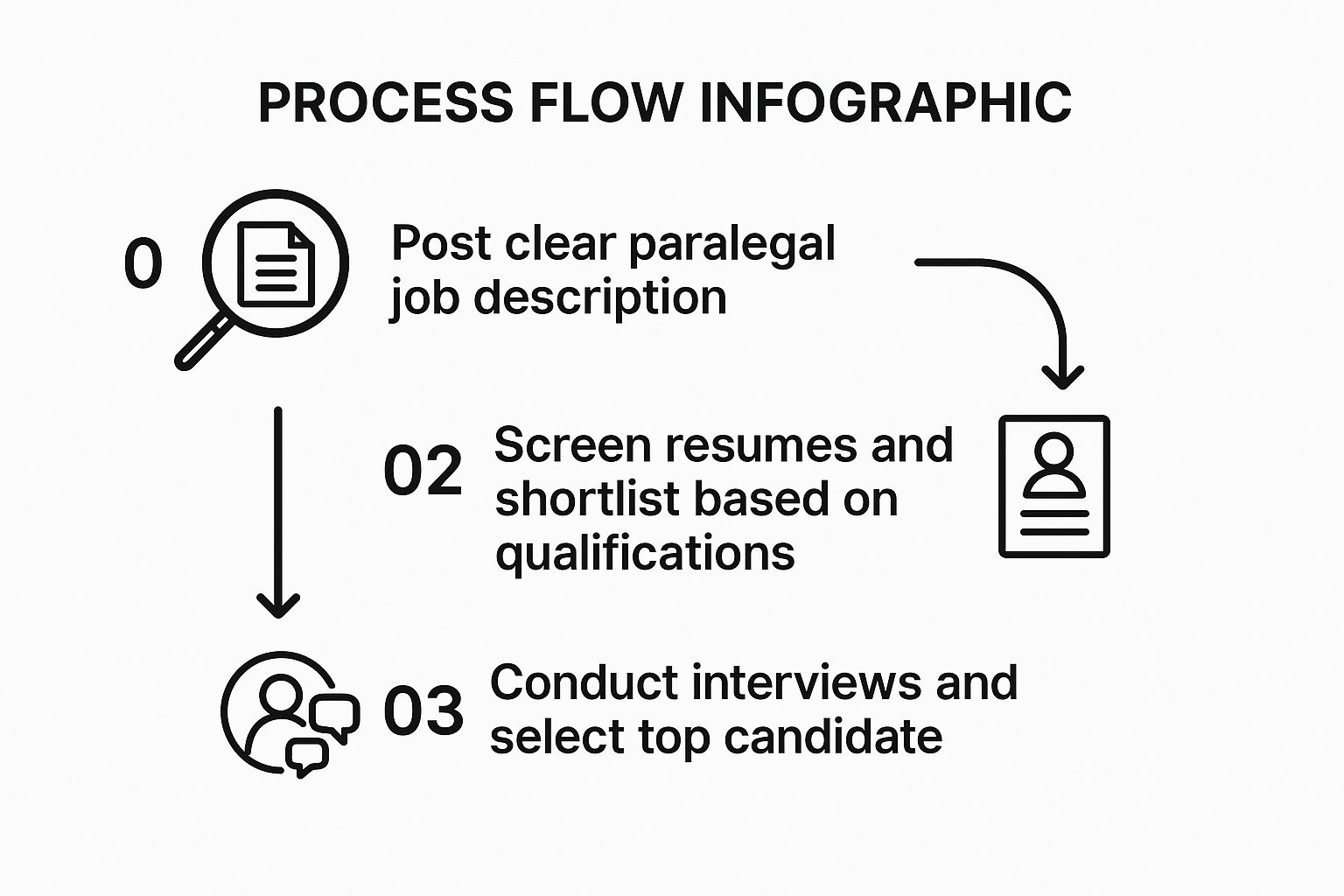
 19 minutes read
19 minutes read
Bringing on a paralegal isn't just about handing off work—it's a strategic move to get your time and sanity back. It's about that moment you realize your own billable hours are tanking because you're swamped with administrative tasks a skilled professional could crush more efficiently and at a much lower cost.

Let's be real. The idea of hiring a paralegal probably popped into your head somewhere between a looming deadline and your third coffee of the afternoon. It's that dawning realization that you’re spending more time formatting documents and chasing down signatures than you are actually practicing law.
This decision is a big one. It's a strategic investment that can either launch your firm to the next level or become a very expensive misstep. The true tipping point isn't just about being busy; it’s when your own workload is actively preventing your firm from growing.
You don’t need an outside consultant to spell it out for you. The signs are usually staring you right in the face. Are you personally handling tasks that a paralegal could easily manage? Is client communication falling through the cracks because you're stretched too thin?

The gut check is simple: If you’re drowning in non-billable work instead of focusing on high-value legal strategy and client acquisition, you’re not just overworked—you’re actively losing money. A paralegal isn't a cost; they're an investment in reclaiming your most valuable asset: your billable time.
The demand for talented paralegals is on the rise for a reason. Smart firms are getting it. In fact, employment for paralegals is projected to jump by 12% through 2030, which translates to about 43,000 new openings every year. This isn't just a trend; it's a fundamental shift in how successful law firms operate. You can dig into the paralegal job outlook and see the data for yourself.
To help you decide, I've put together a quick "Hire vs. Suffer" calculator. It breaks down the pain points you're likely feeling against the real-world cost of doing nothing.
| Pain Point You Are Feeling | The Real Cost of Inaction | How a Paralegal Solves It |
|---|---|---|
| You're stuck on admin tasks | Losing $200+/hr on work a paralegal could do for a fraction of the cost. | Frees up your time for high-value legal work and business development. |
| Deadlines feel impossible | Risk of malpractice, damaged reputation, and stressed-out clients. | Implements systems to track deadlines, file documents on time, and manage the calendar. |
| You can't take on new clients | Your firm's growth hits a hard ceiling, and revenue flatlines. | Increases capacity, allowing you to serve more clients without sacrificing quality. |
| Client communication is suffering | Unhappy clients leave bad reviews and don't refer new business. | Becomes a reliable point of contact for clients, providing updates and handling inquiries. |
If you're nodding along to the "Pain Point" column, the cost of inaction is already piling up.
So, here are the non-negotiable signs it's time to find that perfect paralegal:
If any of these hit a little too close to home, the decision has already been made for you. The only question now is how to find the right person for the job without wasting a ton of time and money in the process.

Let’s get one thing straight: a job description is a sales pitch. You're selling a role, your firm, and a potential future to a professional who has plenty of options. If your job description reads like a dry legal statute, you’ll only attract people who are good at reading them… and not much else.
Most law firms get this completely wrong. They slap together a laundry list of "must-haves" and "required skills" that sounds more like an interrogation than an invitation. This approach doesn't attract A-players; it just filters out the obviously under-qualified while boring the highly-qualified to tears. It's time to stop writing legal briefs and start writing compelling ads.
To stop the flood of lukewarm candidates, you have to structure your job description around what actually matters. After years of hiring, I’ve found that focusing on three core pillars is what separates a good job post from a great one. This isn't just theory; this is what gets the right people to actually click "apply."
Responsibilities (The Day-to-Day): Be brutally honest about the work. Don’t just write "draft legal documents." Get specific. Try something like, "You'll be responsible for drafting, reviewing, and filing initial pleadings for up to 15 new personal injury cases per month." Specificity is your best friend here.
Outcomes (The 90-Day Win): This is the real game-changer. Instead of just listing duties, describe what success actually looks like in the role. For example: "Within your first 90 days, you will have independently managed the discovery process for three litigation cases, reducing attorney review time by 20%."
Culture (Why You?): Why should a top-tier paralegal work with you and not the firm down the street offering a similar salary? Is it the autonomy you offer? The direct client contact? The fact that you don't micromanage? Sell your firm’s unique value proposition.
This simple shift in focus changes the entire conversation from "what we require of you" to "what you will achieve with us." It’s a subtle but incredibly powerful change.
When you’re hiring a paralegal, specificity also helps you tap into high-growth areas of law. Think about where the industry is heading. Paralegal expertise is in huge demand for fields like data privacy, IP law, and corporate M&A. If you need a specialist, state it clearly.

Your goal is to write a job description that makes the wrong people think, "Nope, not for me." Vague descriptions attract vague, unmotivated candidates. A sharp, challenging description that sets high expectations will attract professionals who are eager to meet them.
You should also be clear on baseline qualifications without getting lost in the weeds. While hands-on experience often trumps a piece of paper, mentioning specific certifications can help filter for a certain level of formal training. If you're unsure what's standard, our guide on paralegal certification requirements can help you set the right baseline.
Get specific, sell the vision, and watch your applicant quality skyrocket.

Let's be blunt: posting a job ad on a massive online board and just hoping for the best isn’t a strategy. It’s a recipe for a flooded inbox, forcing you to spend hours sifting through hundreds of resumes from people who are clearly not a fit.
Hope you enjoy spending your afternoons fact-checking resumes and running interviews—because that’s now your full-time job.
The reality is, the most talented paralegals aren't endlessly scrolling through those mega-sites. They’re often passive candidates—people who are already employed but would consider a move for the right opportunity. This means you need to be strategic and targeted, more like a spear fisherman than someone casting a giant, exhausting net.
Sure, you can always go the traditional route. Platforms like LinkedIn and Indeed are the obvious first thought, but they come with a significant drawback: an overwhelming amount of noise. For every truly qualified applicant, you’ll likely get 50 others who didn't even read your job description.
Legal-specific job boards can be a small step up, but frankly, many of them feel dated and have limited reach. You might get a few decent leads, but you're still playing a numbers game. It’s better than nothing, but it’s a long way from being efficient.
After years of trial and error—and believe me, there was a lot of error—I've found that the best candidates come from channels that most law firms completely overlook. These are the places where skilled, motivated paralegals actually gather.
Local Paralegal Associations: This is my go-to tactic. Nearly every state and major city has a paralegal association. Think local chapters of groups like NALA or the NFPA. A single email to their listserv or a post on their private job board puts your opening directly in front of a pre-vetted, highly engaged audience.
Community College Career Centers: Don’t underestimate this source. Many community colleges have excellent, ABA-approved paralegal programs. Their career services staff are eager to connect their top graduates and experienced alumni with reputable firms just like yours.

The goal isn’t to get the most applicants; it’s to get the right applicants. Tapping into these niche communities dramatically increases your odds of finding someone who is not only skilled but also genuinely interested in the work your firm does.
Finally, never forget the power of a solid referral program. Offering a bonus for a successful referral is some of the best recruiting money you'll ever spend. Your current team understands your firm's culture and standards better than anyone. They aren't going to recommend someone who will make their own jobs harder.
For those on the other side of the hiring table, our guide on finding freelance legal jobs offers a paralegal's perspective on where the best opportunities are often found.
A polished resume and a charming personality are great. But they mean absolutely nothing if the candidate can’t actually do the work. The interview is where you brutally separate the real contenders from the well-spoken pretenders.
Forget those generic "what's your biggest weakness?" questions—they’re a complete waste of time. I've found a battle-tested, three-stage process that’s designed to expose weaknesses and highlight true competence. Get this part right, and you’ll avoid the gut-wrenching pain of a bad hire.
Think of this first conversation as a 15-minute gut check, not a full-blown interview. The goal is simple: confirm basic competence, get a feel for their communication skills, and see if their personality might actually mesh with your team.
You’re listening for clarity, professionalism, and genuine interest in your firm. If they can’t articulate why they want this specific job, or if they sound like they’re just reading from a script, it’s a hard pass. This initial call should easily weed out at least half of your applicants.
Welcome to the main event. In my experience, this is where 80% of candidates fail, and it’s the single most important part of the entire hiring process. Give them a real-world, timed assignment that mirrors a task they would actually perform for you.

Don't ask them to describe how they'd draft a motion; make them draft a simple one. Don’t just ask if they’re detail-oriented; give them deposition transcripts to summarize and see if they miss the key facts. This isn’t about being tricky. It’s about verifying skills, not just taking them at their word.
Here’s a quick look at where this critical stage fits into the overall hiring flow.

The infographic shows a simplified path, but that skills test is the essential gatekeeper. It ensures only top-tier talent moves forward. Keep the task relevant, make it timed (an hour is usually plenty), and be clear that you value their time and this is a paid test. That small cost is an insurance policy against a multi-thousand-dollar hiring mistake.
If a candidate has made it this far, you already know they have the skills. This final interview, usually with you and maybe one other key team member, is all about assessing their problem-solving instincts and how they’d fit into your team's dynamics. This is where you dig into how they think.
Ask pointed situational questions. "Describe a time an attorney you supported made a mistake on a filing. What did you do?" Their answer tells you everything about their loyalty, their approach to problem-solving, and their ability to handle pressure. You need to know how they’ll react when things inevitably go sideways.
For more ideas, our guide on legal assistant interview questions has a solid list of questions that can help you probe deeper. By combining these behavioral questions with the results from their practical test, you get a complete picture of the candidate—not just the polished version they want you to see.
You’ve found your star player. The interviews were fantastic, the skills test was a slam dunk, and you’re ready to extend an offer. This is the final, crucial step—don't drop the ball now with a weak offer or, even worse, a sloppy onboarding process.
Making a competitive offer isn't just about tossing a number out there and hoping it lands. This is not a buyer's market. With the unemployment rate for paralegals sitting at a razor-thin 1.9%, it's practically full employment. This means your top candidates have plenty of options, and a subpar offer will get you ghosted fast. You can get a better sense of the current demand for paralegals to see just how fierce the competition really is.
Before you start thinking you need to offer a Silicon Valley-style salary, take a step back. Turns out there’s more than one way to get an elite paralegal without mortgaging your office ping-pong table. What truly attracts and keeps top-tier talent is a smart blend of fair compensation and perks that actually matter to them.
Here’s what really works:
This is the part where so many firms stumble. A new hire's first month is the most critical period. It will either set them on a path to becoming a productive team member quickly or a frustrated one who starts quietly looking for another job.

A killer onboarding isn't about a welcome basket and a mountain of HR forms. It’s a structured, week-by-week plan designed to intentionally integrate them into your firm's systems, workflows, and culture. Get this right, and you can cut their ramp-up time in half.
Your primary objective is to eliminate confusion and empower them to start contributing with confidence. Throwing someone into the deep end isn't just lazy; it’s a recipe for failure. A structured approach is the only way to build their competence from day one.
Here’s a simple framework to follow:
Week 1: Tech, Tools, and Team
Their first day should involve zero guesswork. Make sure all their equipment is ready to go, software logins are active, and they get a hands-on walkthrough of your case management system and communication platforms. It's also a great idea to assign them a "buddy" on the team—someone they can go to with the small questions they might be too shy to ask you directly.
Week 2: Diving into Your Workflows
Now you can start introducing them to how your firm actually works. Shadowing another paralegal for a few hours is invaluable here. Take the time to walk them through your specific filing system, document naming conventions, and protocols for client communication.
Week 3: First Assignments and Feedback
It's time to give them their first real, but low-stakes, tasks. This could be something like summarizing a deposition transcript or drafting a standard motion. The goal here is to build momentum and provide immediate, constructive feedback that helps them learn your standards.
Week 4: Integrating with Cases and Clients
Start bringing them into the fold on the key cases and clients they'll be supporting. Invite them to sit in on relevant meetings and client calls. This helps them connect the dots between the tasks on their plate and the bigger picture of the case strategy.
Alright, let's get into the nitty-gritty. By now, you've probably got a dozen questions bouncing around your head about the practical side of hiring a paralegal. I get it. I’ve been there.
Here are the straight, no-fluff answers to the most common questions I hear from other firm owners who are finally ready to make this leap. No corporate speak, just what I’ve learned from being in the trenches.
Let’s cut to the chase—it’s more than just the salary. If you’re only looking at the base pay, you’re setting yourself up for a nasty surprise when the first payroll hits. A good rule of thumb is to budget 1.25x to 1.4x their annual salary for the fully-loaded cost.
So, for a paralegal with a $60,000 salary, you should realistically plan to spend between $75,000 and $84,000 per year. This accounts for the fun stuff like payroll taxes, benefits, and overhead like software licenses and equipment. Don't forget the one-time costs of recruitment, especially if you’re paying for job postings or a skills test. It's a real investment, which is exactly why you can't afford to get it wrong.
This is where you need to be honest about what your firm truly needs. Each model serves a totally different purpose, and picking the wrong one is like buying a sports car for a camping trip—it looks cool but is fundamentally useless for the job.
Let’s break them down:
Your choice here hinges entirely on your need for consistency, your budget, and how much direct control you want to have over their day-to-day work.
Oh, I’ve seen them all. But the most common and costly mistakes usually fall into three buckets. Avoid these, and you’re already ahead of 90% of firms.
First, having a vague role definition. Hiring someone to "help out with everything" is a disaster waiting to happen. Before you know it, your skilled paralegal is basically an expensive personal assistant, and you're both frustrated.

The second big mistake is underutilizing them. You hired a trained professional for their legal skills. Delegate substantive work they are qualified to handle. If they’re just scanning documents and scheduling your appointments, you’ve failed them and your firm.
Finally, failing to onboard them properly. Just throwing a new hire into the deep end without a structured plan for their first 30 days is pure laziness. A methodical onboarding process covering your specific software, client protocols, and workflows is absolutely non-negotiable.
Honestly? It depends. A certificate from an ABA-approved program is a solid signal that a candidate has formal training and understands the fundamentals. But I'll tell you right now, I’d take a paralegal with ten years of hands-on trial prep experience over a fresh graduate with a fancy degree any day of the week.
Experience in your specific practice area often trumps a piece of paper. The ultimate litmus test isn't their resume; it's their performance on the practical skills test you give them during the interview process. Let their actual work, not their credentials, be the final judge.
Ready to skip the endless resume-sifting and find a top-tier remote paralegal in as little as 24 hours? At HireParalegals, we've already done the hard work of vetting thousands of experienced legal professionals. We’re not saying we’re perfect. Just more accurate more often. (Toot, toot!) Let us connect you with a curated shortlist of talent perfectly matched to your firm's needs. Find your perfect paralegal today.